Books by Michael Goodman
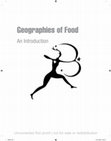
https://bit.ly/2Y147Ax, 2021
This is a book which addresses the “what,” “where,” “who,” “how,” and “why” questions about food.... more This is a book which addresses the “what,” “where,” “who,” “how,” and “why” questions about food. What is food and where does it come from? Who grows and makes food, and who eats it? Why do some people have more than enough whilst others go hungry? How is food made and what are its impacts on people and places? Questions about power, injustice, and inequality are always present when we start to map the geographies of food, but so are stories of hope, possibility, and new futures. Whilst we engage with many problems, we also discuss many exciting new possibilities, and try to reflect the politics of hope and optimism which infuse many grassroots movements which are trying to develop new and better ways of “doing food.” We try to examine the problems and possibilities of food in equal measure and we foreground the particular insights that geographical perspectives can yield, by concentrating on the spatial expressions of food’s production, transformation, and consumption.

Reconnecting so-called alternative food geographies back to the mainstream food system - especial... more Reconnecting so-called alternative food geographies back to the mainstream food system - especially in light of the discursive and material 'transgressions' currently happening between alternative and conventional food networks, this volume critically interrogates and evaluates what stands for 'food politics' in these spaces of transgression now and in the near future and addresses questions such as: What constitutes 'alternative' food politics specifically and food politics more generally when organic and other 'quality' foods have become mainstreamed? What has been the contribution so far of an 'alternative food movement' and its potential to leverage further progressive change and/or make further inroads into conventional systems? What are the empirical and theoretical bases for understanding the established and growing 'transgressions' between conventional and alternative food networks? Offering a better understanding of the evolving position of the corporate food system vis a vis alternative food networks, this book considers the prospects for economic, social, cultural and material transformations led by an increasingly powerful and legitimated alternative food network.

Farmers’ markets, veggie boxes, local foods, organic products and Fair Trade goods – how have the... more Farmers’ markets, veggie boxes, local foods, organic products and Fair Trade goods – how have these once novel, "alternative" foods, and the people and networks supporting them, become increasingly familiar features of everyday consumption? Are the visions of "alternative worlds" built on ethics of sustainability, social justice, animal welfare and the aesthetic values of local food cultures and traditional crafts still credible now that these foods crowd supermarket shelves and other "mainstream" shopping outlets?
This timely book provides a critical review of the growth of alternative food networks and their struggle to defend their ethical and aesthetic values against the standardizing pressures of the corporate mainstream with its "placeless and nameless" global supply networks. It explores how these alternative movements are "making a difference" and their possible role as fears of global climate change and food insecurity intensify. It assesses the different experiences of these networks in three major arenas of food activism and politics: Britain and Western Europe, the United States, and the global Fair Trade economy. This comparative perspective runs throughout the book to fully explore the progressive erosion of the interface between alternative and mainstream food provisioning. As the era of "cheap food" draws to a close, analysis of the limitations of market-based social change and the future of alternative food economies and localist food politics place this book at the cutting-edge of the field.
The book is thoroughly informed by contemporary social theory and interdisciplinary social scientific scholarship, formulates an integrative social practice framework to understand alternative food production-consumption, and offers a unique geographical reach in its case studies.
"
"An examination of the relationship between space, place and consumption offers important insight... more "An examination of the relationship between space, place and consumption offers important insights into some of the most powerful forces constructing contemporary societies. Space and place are made and remade through consumption. Yet how do cultures of consumption discover space, and how do they construct place?
This book addresses these questions by exploring the implications of conceptualizing consumption as a spatial, increasingly global, yet intensely localized activity. The work develops integrative approaches that articulate the processes involved in the production and consumption of space and place. The result is a varied, engaging, and innovative study of consumption and its role in structuring contemporary capitalist political econom"

"The human-environment relationship - intimately intertwined and often contentious - is one of th... more "The human-environment relationship - intimately intertwined and often contentious - is one of the most pressing concerns of the 21st century. Explored through an array of critical approaches, this book brings together case studies from across the globe to present significant cutting-edge research into political ecologies as they relate to multi-form contestations over environments, resources and livelihoods.
Covering a range of issues, such as popular discourses of environmental 'collapse', climate change, water resource struggles, displacement, agro-food landscapes and mapping technologies, this edited volume works to provide a broad and critical understanding of the narratives and policies more subtly shaping and being shaped by underlying environmental conflicts.
By exploring the power-laden processes by which environmental knowledge is generated, framed, communicated and interpreted, Contentious Geographies works to reveal how environmental conflicts can be (re)considered and thus (re)opened to enhance efforts to negotiate more sustainable environments and livelihoods. "
Papers and Chapters by Michael Goodman
This report explores what UK farmers think about cultured meat and how the technology could affec... more This report explores what UK farmers think about cultured meat and how the technology could affect them in practice. It summarises a two-year interdisciplinary study, analysing social media, discussing the technology with groups of farmers, working with diverse farm businesses across the UK, and modelling novel approaches to cultured meat production based on agricultural by-products. Our team and partners included natural and social scientists, farming representatives, cultured meat businesses, NGOs and policy makers.
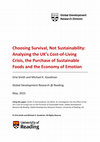
Global Development Research at Reading, 2023
In August 2021, the United Kingdom (UK) entered a cost-of-living crisis, which has resulted in ec... more In August 2021, the United Kingdom (UK) entered a cost-of-living crisis, which has resulted in economic difficulties for many households across the UK. This paper investigates how the UK’s cost-of-living crisis has impacted the purchase and consumption of sustainable food products, which are defined in this study as fair-trade, organic, local, and vegan/vegetarian food products. Using an online survey and semi-structured interviews, wider themes are also explored, considering how an inability to purchase sustainable goods emotionally impacts consumers, and questioning the broader notion of commodifying care and politics. This study found that economic constraints were the most common barrier to sustainable consumption, but that awareness, time, and product availability were also important factors which could inhibit sustainable food purchases. The role of emotions, especially consumer guilt, emerged to be a significant influence in consumer attitudes towards sustainability. Similar to previous research, the study concludes that the commodification of care through food consumption is problematic and excludes certain socio-economic groups from participating in the expression of care in this way, which is further entrenched in periods of economic difficulty, such as the cost-of-living crisis. Overall, this project highlights the issues associated with a reliance on consumers to incite market-mediated change, particularly throughout the cost-of-living crisis, and how the responsibilisation of individuals to consume sustainably creates disproportionate burdens across varying socio-economic demographics.
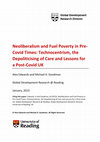
Global Development Research at Reading, 2023
In pre-Covid times, the British government made the elimination of fuel poverty a central tenet o... more In pre-Covid times, the British government made the elimination of fuel poverty a central tenet of its energy policy. Yet, fuel poverty remains a crucial area of concern for both policymakers and the British public especially given the hardships experienced by those in relative poverty over the Covid lockdowns and the current post-Covid ‘cost of living’ crisis (Rawlinson, 2022). In an effort to explore why these past practices aimed at ending fuel poverty fell short and might provide some lessons for a post-Covid UK, this paper seeks to examine how an increasingly technocentric view of fuel poverty and its drivers may be seen as limiting the effectiveness of policy. Building on an increasing body of work focusing increasingly on the importance of the “lived experience” of fuel poverty and energy vulnerability, this paper examines how traditional indicators fail to adequately address what Middlemiss and Gillard (2015) term the complex and dynamic nature of people's relationship with energy. Using an ethnographic approach, this paper seeks to highlight real world examples of how a technocentric definition of fuel poverty is falling short and not having the desired impact. We examine how methodologies aimed at quantifying diverse measures of well-being discount the lived experience of poverty and ignore the diverse set of factors that produce and reinforce it. We examine issues regarding the compatibility of the responsibilisation and subjectification of the fuel poor with their relative position of vulnerability and disconnection, and how their lack of mobility, both real and perceived, may limit their ability to act as rational agents as intended by neoliberal forms of policy. Here we show how this neoliberalisation and technocentrism of ‘solving’ the fuel poverty crisis works to depoliticise societal care towards some of its most vulnerable members in the UK.
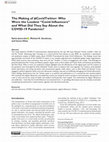
Social Media + Society, 2024
This study explores COVID-19 communications disseminated by the top 100 most followed Twitter pro... more This study explores COVID-19 communications disseminated by the top 100 most followed Twitter profiles-what we call the Twitter influencing elite. Focusing on a critical period from January to July 2020, we conducted a quantitative and qualitative analysis of 6,602 tweets about COVID-19 produced by these Covid Influencers. The findings reveal that approximately two-thirds of the COVID-19 tweets in our sample originated from established global media organizations. While these sources were prominent, they were not the "loudest" in terms of engagement and virality. That belonged to powerful politicians like Trump and Obama, popular singers such as Harry Styles and Taylor Swift, and business personalities like Elon Musk. What is more, our qualitative analysis highlights how the affordances of the digital space and the context of the pandemic were leveraged by these influential Twitter users to advance their own agendas. For instance, some blended health information and caring narratives with promotional appeals, while others, such as Elon Musk and Donald Trump, engaged in political agitation and/or anti-care discourses creating a staccato of conflicting messaging and mis/dis-information. These findings demonstrate that the Twitter space is as political and politicized as it is commercial and commercialized. We conclude that digital influencers and celebrities cannot just simply be used to produce communications during times of crisis as many across the study of health and medical communication have argued. The involvement by digital influencers and celebrities-much like the Covid Influencers we examined herein spreading information must be critically scrutinized, considering the potential for mixed motives, agendas, and real-world outcomes.
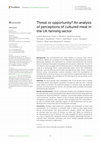
Frontiers in Sustainable Food Systems, 2023
Background: The environmental and social impacts of cultured meat, and its economic viability, ar... more Background: The environmental and social impacts of cultured meat, and its economic viability, are contingent on its implications for food production and for agriculture. However, the implications of cultured meat production for farmers have not yet been thoroughly investigated and are poorly understood. The aim of this research was to engage with the farming sector in critically assessing cultured meat as a technology which could profoundly affect future farm livelihoods, land use, rural and farming communities and agricultural value chains. Ensuring farmers’ voices, and potential ‘counter-narratives’ inform the development of cultured meat is not only inclusive, but could identify unexpected impacts of this emerging technology and contribute to the framing of the social license of the industry developing them.
Methods: Six focus groups were undertaken with 75 UK farmers from a variety of farming sectors and regions. Questions focused on what the term ‘cultured meat’ means to farmers, the potential impacts of cultured meat, and potential business scenarios arising for farmers. All meetings were recorded, transcribed, and thematically analyzed.
Results and discussion: Farmers expressed complex and considered reflections on cultured meat, raising several perceived opportunities and risks associated with the themes of ‘ethics and affective’ narratives, ‘environment-based’ narratives, and ‘socio-economic’ narratives. Aspects of foci of power, food system control and transparency associated with cultured meat emerged from the conversations, as well as cultured meat’s potential impacts on the environment and on jobs, farming/rural communities and connecting with the land.
Conclusion: Globally, meat production underpins the livelihoods of many rural communities, so a transition to cultured meat is likely to have deep-seated ethical, environmental, and socio-economic impacts. Within the discourse on cultured meat the voices of farmers are often lost. While not claiming to be representative of all UK farming, this study engaged UK farmer perspectives as a way of starting the substantive process of greater stakeholder inclusion in cultured meat innovation pathways, and which should underpin responsible technology transitions in agriculture.
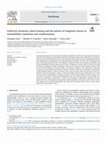
Geoforum, 2023
A geographical perspective is crucial to understanding sustainability transitions and transformat... more A geographical perspective is crucial to understanding sustainability transitions and transformation, but previous research on place framing in sustainability transitions and transformation has had a marked focus on the politics of the future and its performativity in the present. This paper analyzes place-framing in sustainability transitions and transformation by examining how the conflicting collective memories of a place and the framings of the future of this place interact and lead to the justification of particular forms of socio-material development, land use and sustainability of the peri-urban spaces of the city of Sogamoso, Colombia. Based on 38 semi-structured interviews, we identify three distinct assemblages of future visions, collective memories and place frames, which we call urban development, recovering tradition, and cultural revitalization. The analysis shows that place framing is an exercise through which collective memories and future visions are connected and co-constituted in a spatio-temporal 'dialogue': collective memories, future visions and place frames are processes of social construction activated in the attempt to shape or contest sustainability transitions and transformation. We contend that the existence and mobilization of collective memories-and their critical influence on future visions-are a core aspect of the politics of place framing fundamental to the socio-material processes of sustainability transitions and transformation. Furthermore, a politics of place-making in sustainability transitions and transformation involves acknowledging and negotiating collective memories of the past as much as future visions. This suggests ways to critically counterbalance the marked future orientation taken in recent years by sustainability science and transition studies.
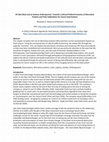
A Research Agenda for Food Systems, 2022
This chapter considers the rise of alternative proteins (APs) and their current and potential imp... more This chapter considers the rise of alternative proteins (APs) and their current and potential impacts on food systems. Using the conceptual lens of cultural political economy, we analyse APs through two separate 'moments'. First, we explore the promissory narratives and resistances APs have encountered as they have been marketised and mainstreamed. Here we pay particular attention to the ways that the narratives of urgency, anxiety and crisis, plus the scale of livestock-related problems in the Anthropocene, have (re)authorised Big Food's role in delivering sustainable food systems. Our second moment is more speculative. Refracted through philosophical and geographical treatments of APs, we explore the ethical, material and spatial implications of cell-cultured meat and ask what is disrupted and what is maintained through this particular version of doing meat differently. We conclude with questions for future research on APs in the context of the changing contours of the food system.

Development and Change, 2022
Throughout the world, 785 million people lack a basic drinking-water service and at least 2 billi... more Throughout the world, 785 million people lack a basic drinking-water service and at least 2 billion people consume contaminated drinking water. At the same time, numerous global water charities fronted by 'caring', politicized celebrity figures-dubbed the 'high priests' of global development by the authors of this article-have sought to 'solve' inequalities in access to clean water through market-based solutions and charity donations. This article engages with the fields of critical social theory, political theology, political ecology and celebrity studies to analyse the interrelationship between capitalism and religion, to interrogate the drivers of international development, and to historically situate the work of celebrity-led water charities and the growing role of these 'high priests'. It takes the case of Matt Damon's Water.org to examine the increasingly religious nature of these neoliberalized charity processes, and outlines the main elements of what the authors term a contemporary political economy of sacrifice. They argue that this results in charities that, rather than reducing inequalities, actually reproduce, normalize and legitimize the very system and exploitative relations that are responsible for these inequalities and environmental problems in the first place, while scattered and localized fixes sustain the illusion that things are getting better. 1. CNBC, 'Matt Damon's not acting. There's a water crisis': www.cnbc.com/2014/01/22/mattdamons-not-acting-theres-a-water-crisis.html/ (accessed 13 January 2021).
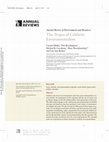
Annual Review of Environment and Resources, 2020
Celebrity advocacy for environmental causes has grown dramatically in recent decades. An examinat... more Celebrity advocacy for environmental causes has grown dramatically in recent decades. An examination of this expansion and the rise of causes such as climate change reveals the shifting politics and organization of advocacy. We address these changes to the construction and interpretation of celebrity advocacy and detail how they have produced a rich variety of environmental celebrity advocates. We also account for differences between legacy (e.g., radio, TV, newspapers) and online celebrities and their practices (e.g., hash-tag publics, brandjacking, online communities). Environmental celebrity ad-vocates' performances can be divided into nine tropes, each characterized in part by the particular varieties of environmentalism that they promote. We present the tropes and discuss their five cross-cutting themes. We conclude with a set of questions for future research on celebrity environmentalism.
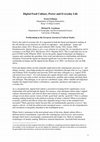
European Journal of Cultural Studies, 2021
Food is the stuff of everyday life. It is ingrained in both the literal and figurative making of ... more Food is the stuff of everyday life. It is ingrained in both the literal and figurative making of the self and the social structures by which we reproduce-and challenge-norms and hierarchies (Julier 2013; Watson and Caldwell 2005; Goody 1982; Goody 1998). Simultaneously, digital culture is also a core element of everyday life, its reproduction and its resistances (van Dijck 2013; McChesney 2013; Thumim 2012). This is especially true in our post-COVID world (Wheeler 2020). Across the globe, digital technologies are helping to organise and constitute the quotidian, from work and education to relationships and identity formation. Food and the digital are deemed significant even in their absence, as seen in scholarship on hunger and the digital divide (Runge et al. 2003; van Deursen and van Dijk 2014). Food and digital culture are thus mutually implicated in the contemporary processes of – and debates around – knowledge production and power distribution through what we (e.g. Lupton and Feldman 2020; Goodman and Jaworska 2020) and other colleagues (e.g. Lupton 2018) call digital food culture . Yet each domain also signals distinct rules, values and aspirations. This special issue seeks to draw out these distinctions, parallels and overlaps and bring them into dialogue. That dialogue, as we and our contributors argue, offers valuable and important insights into digital food culture’s affordances, capacities, paradoxes and impacts on everyday life.
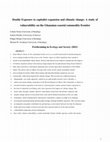
Ecology and Society, 2021
Jason Moore's theory of the commodity frontier serves as a useful framework for demonstrating the... more Jason Moore's theory of the commodity frontier serves as a useful framework for demonstrating the socio-ecological upheaval that occurs in the 'frontier' spaces to which capitalism must expand in search of uncommodified 'cheap' nature. Work to date however has failed to consider how the impacts of frontier expansion interact with climate change despite the two phenomena being closely linked in both causes and effects, and largely impacting most severely upon rural communities in the Global South. This article seeks to address this gap with a focus on the coastal commodity frontier: socio-ecological systems within which marine and terrestrial frontier expansion can occur concurrently, while being impacted by climatic change. The research was conducted using an ethnographic, case study approach, centred on an eight-month research visit to Aboadze, a small-scale marine fishing community in the Western Region of Ghana. This community is subject to terrestrial frontier expansion in the form of a thermal power station, marine frontier expansion in the form of industrial overfishing, and is also exposed to the impacts of climate change. The article finds, through a double exposure vulnerability framework, that frontier expansion and climatic change interact to exacerbate food, water and livelihood insecurities in the case study community, whilst simultaneously reducing the community's capacity to adapt to its changing environment and perpetuating harmful global changes through feedback exposures. This research makes an important conceptual contribution by galvanising a conversation between two thus far disparate fields and invites further research to provide more nuanced analyses of the intersectional vulnerabilities impacting coastal communities.
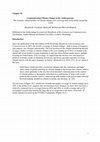
The Routledge Handbook of Environment and Communication, 2022
In this chapter, we survey how legacy and social media representational practices shape the cultu... more In this chapter, we survey how legacy and social media representational practices shape the cultural politics of knowledge, information and news coverage on climate change around the world. Mass media stitch together formal science and policy with everyday activities in the public sphere, yet expressions vary across cultures and social, environmental, economic and political contexts. Since 2015 and the publication of the first edition of this Handbook, the world’s coverage of climate change—both in terms of frequency and content—has changed substantially. To understand these changes, we focus on the shifting production of climate change news across both newspaper coverage and social media to assess how these processes broadly influence awareness and engagement. New data on these changes in coverage from 2014 to 2021 are presented and analysed to bring attention to how power flows through shared as well as different cultures, politics, and societies. In particular, we explore how legacy and social media representations of climate change construct knowledge, norms and conventions about variegated dimensions of climate change through novel coverage of, for example, the Trump presidency, extreme weather events, climate change as an ‘intersectional’ story and the ‘Greta Thunberg Effect’ in the rise of #climatenews in digital spaces. In this new updated chapter, we consider how interactions between science, media, policy, digital technology and the public have contributed to perceptions, misleading debates, priorities and understandings concerning climate change that, in turn, guide efforts seeking to enlarge rather than constrict the spectrum of possibility for responses to climate challenges at multiple scales. Such work builds on and catalyzes ongoing investigations into how environment and communication dynamically influence perceptions, attitudes, intentions, decision-making and management of risk in non-linear, complex ways in a climate changed world.
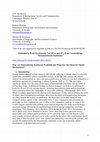
World Development, 2021
Feeling helpful through actions meant to alleviate the suffering of distant others is a recently ... more Feeling helpful through actions meant to alleviate the suffering of distant others is a recently marketable commodity with a considerable history. In the late 18th century, the ethical subject was democratized as ‘more and more people came to believe it was their obligation to ameliorate and prevent wrongdoing to others’ (Laqueur, 2009, p. 37). This provoked significant debate over the janus-faced nature of humanitarian sentiments and the kinds of actions they foster. ‘Sentimental feelings for distant strangers can bind us to suffering at home for all sorts of self-serving reasons’ distorting humanitarian relief and development interventions to follow the ‘topography of observable suffering’ (Watenpaugh, 2015, 213). While seemingly inspiring actions that are well-intentioned, worthy and prioritizing the needs of others, these humanitarian sentiments often have the effect of disempowering the people on whose benefit the actions are predicated. We three have researched, analyzed and critiqued various aspects of the commodification of care, compassion and sentiment. In particular, we have explored the uses of affect in the ‘reputation-washing’ of some of the world’s largest corporate and celebrity actors and the papering over of the need for larger, structural change effected by the mediated hype of these ‘caring commodity’ networks (Goodman, 2010; Hawkins, 2011; Hawkins, 2018; Richey & Ponte, 2011; Goodman et al., 2012; Doyle et al., 2019; Budabin & Richey, 2021). But what if these powerful drives, desires and views of how global problems can be solved through everyday human action were actually designed and deployed to make a profit for the actors who could harness them? And what if these for-profit actors were invited into partnership with non-profit partners, and specifically authorized by the international community as the way to promote global development in an interconnected world?
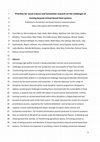
Humanities and Social Sciences Communications, 2021
Increasingly high-profile research is being undertaken into the socio-environmental challenges as... more Increasingly high-profile research is being undertaken into the socio-environmental challenges associated with the over-production and consumption of food from animals. Transforming food systems to mitigate climate change and hidden hunger, ensure food security and health all point to reducing animal-based foods as a key lever. Moving beyond animal-based food systems is a societal grand challenge requiring coordinated international research by the social sciences and humanities. A ‘selective openness’ to this range of disciplines has been observed within multi-discipline research programmes designed to address societal grand challenges including those concerned with the sustainability of food systems, a situation that can inhibit the impact of social sciences and humanities. Further, existing research on animal-based foods within these disciplines is largely dispersed and focused on particular parts of the food system. This paper discusses the results of a research prioritisation process, inspired by the ‘Sutherland Method’, and carried out to enhance capacity, mutual understanding and impact amongst European social sciences and humanities researchers. The iterative prioritisation process produced 15 research questions from an initial list of 100 which we classify under the following five themes: 1) Debating and visioning food from animals; 2) Transforming agricultural spaces; 3) Framing animals as food; 4) Eating practices and identities; 5) Governing transitions beyond animal-based food systems. The themes are important in providing a means of making connections between research questions inviting and steering research on key challenges in moving beyond animal-based food systems. These five themes propose loci for future transdisciplinary research programmes, joining researchers from the natural sciences, social sciences and humanities, and stakeholders from beyond academia to develop cooperative research and implementation initiatives. The experiences gained from the prioritisation process draw attention to the value of spending time to discuss and collaboratively steer research inquiry to respond to emergent and controversial matters of concern. A key tension concerned fundamental, ethical questions around the continuation or complete cessation of the use of animals for food. The positioning of research towards these questions affects not only the framing of the research area but also the partners with whom the research can be carried out and to whom it may be of benefit or harm.
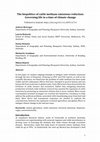
Antipode, 2021
In this paper we analyse ongoing attempts to mitigate cattle methane emissions through the lens o... more In this paper we analyse ongoing attempts to mitigate cattle methane emissions through the lens of biopower. Drawing on IPCC and FAO reports as well as the scientific literature, we detail how the problem of cattle methane has been made visible and the subsequent efforts that have emerged to govern human and non human life from molecular to global scales. Such efforts have been thwarted by the liveliness of cattle, farmers and consumers. Rather than mitigating emissions, production-oriented cattle methane research has assisted the expansion of cattle emissions by promising an immanent solution that is never realised. More recent consumption-oriented strategies are overdue but limited by a hesitancy to fully address the political problems associated with transitioning away from beef and dairy. More direct and transparent responses are needed to confront the contradictions between the expansion of animal agriculture and global efforts to mitigate climate change in fair and just ways.
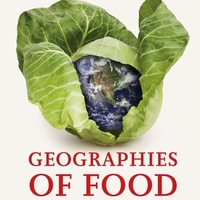






Uploads
Books by Michael Goodman
This timely book provides a critical review of the growth of alternative food networks and their struggle to defend their ethical and aesthetic values against the standardizing pressures of the corporate mainstream with its "placeless and nameless" global supply networks. It explores how these alternative movements are "making a difference" and their possible role as fears of global climate change and food insecurity intensify. It assesses the different experiences of these networks in three major arenas of food activism and politics: Britain and Western Europe, the United States, and the global Fair Trade economy. This comparative perspective runs throughout the book to fully explore the progressive erosion of the interface between alternative and mainstream food provisioning. As the era of "cheap food" draws to a close, analysis of the limitations of market-based social change and the future of alternative food economies and localist food politics place this book at the cutting-edge of the field.
The book is thoroughly informed by contemporary social theory and interdisciplinary social scientific scholarship, formulates an integrative social practice framework to understand alternative food production-consumption, and offers a unique geographical reach in its case studies.
"
This book addresses these questions by exploring the implications of conceptualizing consumption as a spatial, increasingly global, yet intensely localized activity. The work develops integrative approaches that articulate the processes involved in the production and consumption of space and place. The result is a varied, engaging, and innovative study of consumption and its role in structuring contemporary capitalist political econom"
Covering a range of issues, such as popular discourses of environmental 'collapse', climate change, water resource struggles, displacement, agro-food landscapes and mapping technologies, this edited volume works to provide a broad and critical understanding of the narratives and policies more subtly shaping and being shaped by underlying environmental conflicts.
By exploring the power-laden processes by which environmental knowledge is generated, framed, communicated and interpreted, Contentious Geographies works to reveal how environmental conflicts can be (re)considered and thus (re)opened to enhance efforts to negotiate more sustainable environments and livelihoods. "
Papers and Chapters by Michael Goodman
Methods: Six focus groups were undertaken with 75 UK farmers from a variety of farming sectors and regions. Questions focused on what the term ‘cultured meat’ means to farmers, the potential impacts of cultured meat, and potential business scenarios arising for farmers. All meetings were recorded, transcribed, and thematically analyzed.
Results and discussion: Farmers expressed complex and considered reflections on cultured meat, raising several perceived opportunities and risks associated with the themes of ‘ethics and affective’ narratives, ‘environment-based’ narratives, and ‘socio-economic’ narratives. Aspects of foci of power, food system control and transparency associated with cultured meat emerged from the conversations, as well as cultured meat’s potential impacts on the environment and on jobs, farming/rural communities and connecting with the land.
Conclusion: Globally, meat production underpins the livelihoods of many rural communities, so a transition to cultured meat is likely to have deep-seated ethical, environmental, and socio-economic impacts. Within the discourse on cultured meat the voices of farmers are often lost. While not claiming to be representative of all UK farming, this study engaged UK farmer perspectives as a way of starting the substantive process of greater stakeholder inclusion in cultured meat innovation pathways, and which should underpin responsible technology transitions in agriculture.
This timely book provides a critical review of the growth of alternative food networks and their struggle to defend their ethical and aesthetic values against the standardizing pressures of the corporate mainstream with its "placeless and nameless" global supply networks. It explores how these alternative movements are "making a difference" and their possible role as fears of global climate change and food insecurity intensify. It assesses the different experiences of these networks in three major arenas of food activism and politics: Britain and Western Europe, the United States, and the global Fair Trade economy. This comparative perspective runs throughout the book to fully explore the progressive erosion of the interface between alternative and mainstream food provisioning. As the era of "cheap food" draws to a close, analysis of the limitations of market-based social change and the future of alternative food economies and localist food politics place this book at the cutting-edge of the field.
The book is thoroughly informed by contemporary social theory and interdisciplinary social scientific scholarship, formulates an integrative social practice framework to understand alternative food production-consumption, and offers a unique geographical reach in its case studies.
"
This book addresses these questions by exploring the implications of conceptualizing consumption as a spatial, increasingly global, yet intensely localized activity. The work develops integrative approaches that articulate the processes involved in the production and consumption of space and place. The result is a varied, engaging, and innovative study of consumption and its role in structuring contemporary capitalist political econom"
Covering a range of issues, such as popular discourses of environmental 'collapse', climate change, water resource struggles, displacement, agro-food landscapes and mapping technologies, this edited volume works to provide a broad and critical understanding of the narratives and policies more subtly shaping and being shaped by underlying environmental conflicts.
By exploring the power-laden processes by which environmental knowledge is generated, framed, communicated and interpreted, Contentious Geographies works to reveal how environmental conflicts can be (re)considered and thus (re)opened to enhance efforts to negotiate more sustainable environments and livelihoods. "
Methods: Six focus groups were undertaken with 75 UK farmers from a variety of farming sectors and regions. Questions focused on what the term ‘cultured meat’ means to farmers, the potential impacts of cultured meat, and potential business scenarios arising for farmers. All meetings were recorded, transcribed, and thematically analyzed.
Results and discussion: Farmers expressed complex and considered reflections on cultured meat, raising several perceived opportunities and risks associated with the themes of ‘ethics and affective’ narratives, ‘environment-based’ narratives, and ‘socio-economic’ narratives. Aspects of foci of power, food system control and transparency associated with cultured meat emerged from the conversations, as well as cultured meat’s potential impacts on the environment and on jobs, farming/rural communities and connecting with the land.
Conclusion: Globally, meat production underpins the livelihoods of many rural communities, so a transition to cultured meat is likely to have deep-seated ethical, environmental, and socio-economic impacts. Within the discourse on cultured meat the voices of farmers are often lost. While not claiming to be representative of all UK farming, this study engaged UK farmer perspectives as a way of starting the substantive process of greater stakeholder inclusion in cultured meat innovation pathways, and which should underpin responsible technology transitions in agriculture.